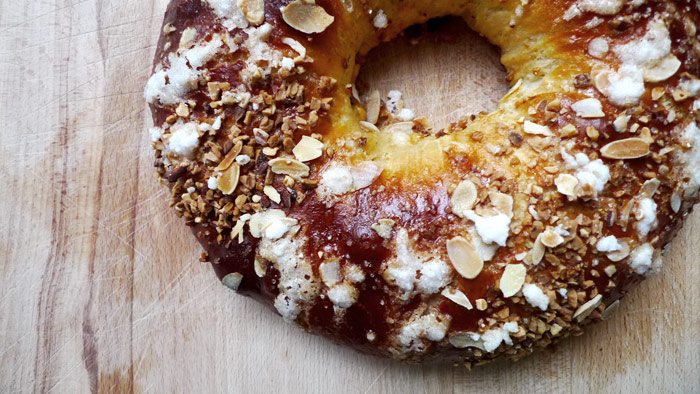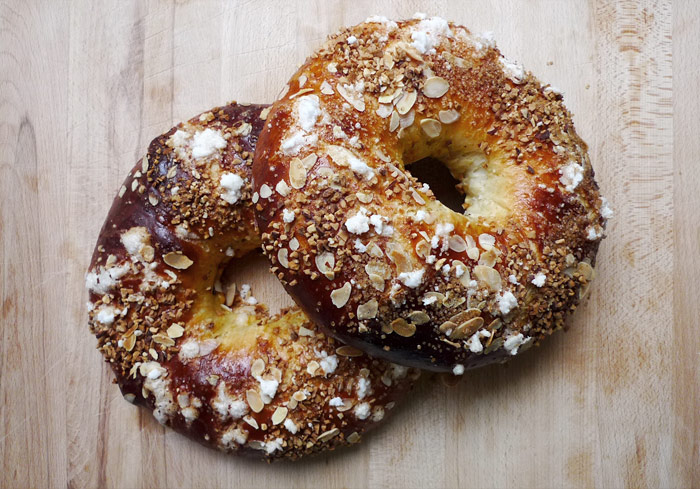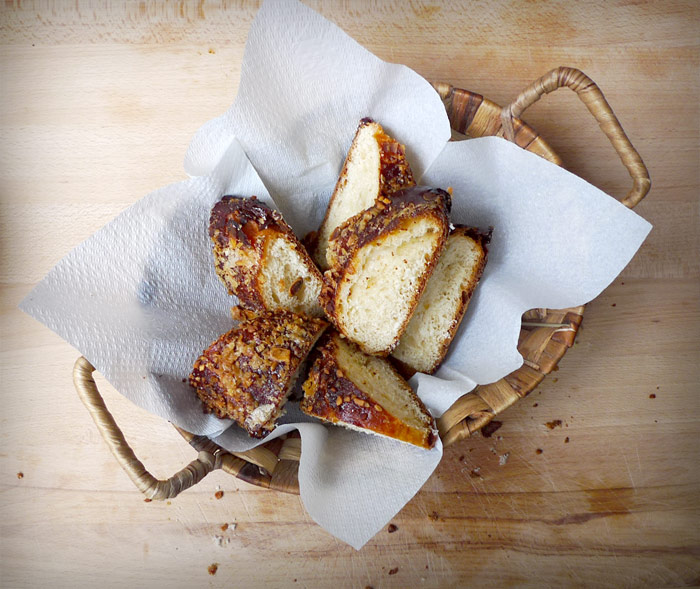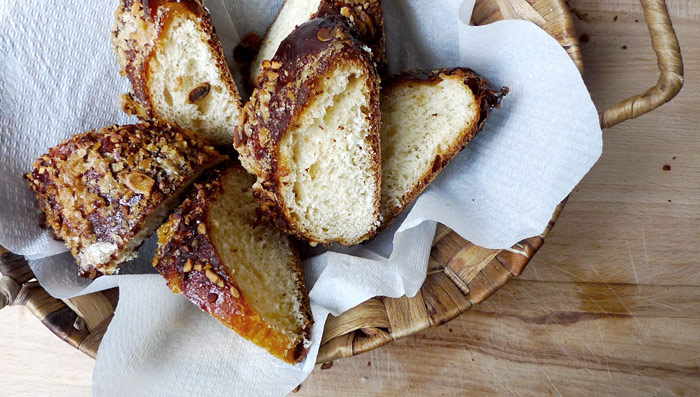

[tp lang=”es” only=”y”] Antes de que se me pasen las fechas en las que aun tendría sentido este post vamos con el roscón de reyes. El año pasado hice mi primer roscón y como salió bastante bien este año repetí. La receta es la misma, la de Madrid tiene miga sólo que yo le añado 7 grs. de levadura y alguna variación más he hecho este año. Me ha parecido menos trabajoso que el año pasado y después de la tortura fracasada de intentar hacer un Panettone de masa madre incluso se me ha hecho fácil! Aunque tiene su aquel. He de reconocer que este bollo navideño tardó mucho en conquistarme. De hecho no fue hasta que probé un roscón casero que mi pobre opinión sobre el roscón cambió. A partir de ese momento nos hicimos amigo, aunque con condiciones… no me gustan las frutas confitadas (para queja de mi chico) y no se las pongo, no me gusta que sepa demasiado a azahar y no me gustan rellenos. Aunque entiendo que para mucha gente sea un roscón demasiado “minimalista” como me dicen, para mi así está perfecto aunque bueno, algún día le pondremos frutas por darle gusto al novio.[/tp]
[tp lang=”es” only=”y”]La receta original de masa madre sin levadura esta aquí.
Os copio la que yo hice.
Ingredientes
- 300 grs. de harina de fuerza
- 7 grs. de levadura fresca
- 140 grs. de masa madre de trigo blanco
- 120 grs. de leche
- 120 grs. de agua
- 100 grs. de azúcar
- 40 grs. de mantequilla
- 2 huevos
- 30-40 grs. de ron
- 4 cucharaditas de agua de azahar
- cáscara de limón
- cáscara de naranja
- canela en rama
- almendras laminadas
- almendras tostadas en trocitos
[/tp]
[tp not_in=”es”]Before we pass the dates in which it makes sense to upload this post let´s go with the Roscón de reyes. For those out of Spain this is a traditional bread made in Christmas time, specifically for “Reyes” which is celebrated in Spain on the 6th of January. Last year I made my first roscón and it went pretty well so I repeated this year. The recipe is the same I used last year from the blog Madrid tiene miga (in spanish).
I added 7 grs. yeast and some variations to the one i’ve done this year. It felt less work than it did last year and after the failed attempt at a sourdough Panettone it even felt easy! Although it has it´s complications. I must admit that this Christmas bread has taken some time to conquer my heart. In fact, it was not until I tried a homemade roscón that my low opinion of it changed. From that moment on we´ve become friends, but with some conditions… I do not like candied fruit (it´s traditional to put some) so I don´t put it, I also do not like too much orange blossom water and I do not like fillers ( it´s also custom to put whipped cream in it) . Although I understand that for many people here my roscón is too “Minimalist” so they say, for me it’s just perfect like this.
Ingredients
- 300 grs. strong bread flour
- 7 grs. yeast
- 140 grs. sourdough white wheat
- 120 grs. milk
- 120 grs. water
- 100 grs. sugar
- 40 grs. butter
- 2 eggs
- 30-40 grs. de rum
- 4 teaspoons orange blossom water
- lemon peel
- orange peel
- cinnamon
- sliced almonds
- chopped toasted almonds
[/tp]
[tp lang=”es” only=”y”]La masa madre
Estuve refrescando mi masa con harina de trigo blanco, usualmente la tengo de centeno integral así que la tuve un par de días a punta de trigo y en el último refresco la alimenté con agua y leche como pone en la receta.
Con la masa madre lista empezamos con el primer turno. En una cacerola mezclar el agua con la leche y hacer una infusión con la piel de naranja, la del limón y la canela. Yo la naranja y el limón los rallé bastante. Dejar que la leche hierva y bajar el fuego. Dejar que se enfríe y cuando esté tibio añadir al azahar y el ron.
Sacamos la canela y parte de la ralladura de limón y naranja. Separamos 90 grs. de la infusión y los mezclamos con la levadura, la masa madre y la harina. Mezclamos muy bien deshaciendo bien la levadura. La masa es bastante pegajosa… amasamos bien hasta que esté suave, la dejamos reposar un rato y le vamos añadiendo la mantequilla de a pocos. Seguimos amasando (un buen rato) hasta que tengamos una masa lisa, suave y que no se nos pegue demasiado a la encimera.
Aquí unté un bowl grande con un poco de mantequilla y la puse a fermentar media hora fuera y luego toda la noche en la nevera. Al día siguiente por la mañana había casi duplicado su volumen.
Dejarla fuera un rato para que se atempere. Luego dividirla en dos formar dos bolas y dejarla reposar otro rato. Formar las roscas rompiendo el centro con los dedos enharinados y estirando la masa hasta darle la forma de anillo. Ponerlas sobre un papel de hornear y poner un vaso untado con un poco de mantequilla en el centro para que no se cierre el agujero.
Lo pintamos con los huevos batidos y lo dejamos fermentando hasta que vuelva a doblar el volumen. Como hace frío los dejé fermentando dentro de mi horno con una jarra de agua caliente para mantenerlos a una temperatura de unos 24-26 grados. Cuando hayan crecido los pintamos otra vez con huevo y le ponemos las almendras y el azúcar mojada (mezclar azúcar blanca con un poquito de agua para hacer esas bolitas que tiene por encima) y listo, al horno 200-220ºC unos 25min.
Tiene su complicación pero se puede hacer y sale bastante bien! Id revisando el horno para que no se queme por arriba y si veis que se tuesta demasiado ponerle un papel aluminio por encima el ultimo rato de horno.[/tp]
[tp not_in=”es”]With our sourdough started and ready to go let´s begin. In a saucepan mix milk with water and make a tea with the orange peel, the lemon and cinnamon. I grated thinly the orange and the lemon. Allow the milk boil and reduce heat. Allow to cool and when warm add the orange blossom water and the rum.
take out the cinnamon and some of the lemon and orange zest. Separate 90 grs. from your infusion and mix with the yeast, the sourdough and the flour. Mix very well for undoing the yeast. The dough is quite sticky… knead well until smooth, let rest for a while and start adding the butter little by little. Continue kneading (quite a while) until you have a smooth dough, smooth and that we is not sticking too much to the counter top.[/tp]
[tp not_in=”es”]Get a large bowl and smear with a little butter. Put the dough inside to begin fermentation after half an hour outside set overnight in the fridge. The next morning it should have doubled its volume.
Leave it outside for a while to warm up. Then divide it into two and form two balls, let it rest for another 10min. Form the rings breaking the center with floured fingers and stretching the dough into the shape of a ring. Put them on a baking paper and place a glass smeared with a little butter in the center so that the hole does not close.
Paint it with the beaten eggs and let it ferment until it doubles the volume again. As it is cold I had it fermenting inside my oven with a jug of hot water to keep them at a temperature of about 24-26 degrees. When they have grown again, paint them with egg for the second time and put the almonds and sugar on top (mix white sugar with a little water to make those sugar balls) Ready, get it to the oven at 200-220ºC about 25min.
It has its complications, but it does pretty well! Check the oven to prevent the top from burning and if you see that it´s getting too toasted put a foil over for the last minutes of cooking.[/tp]


